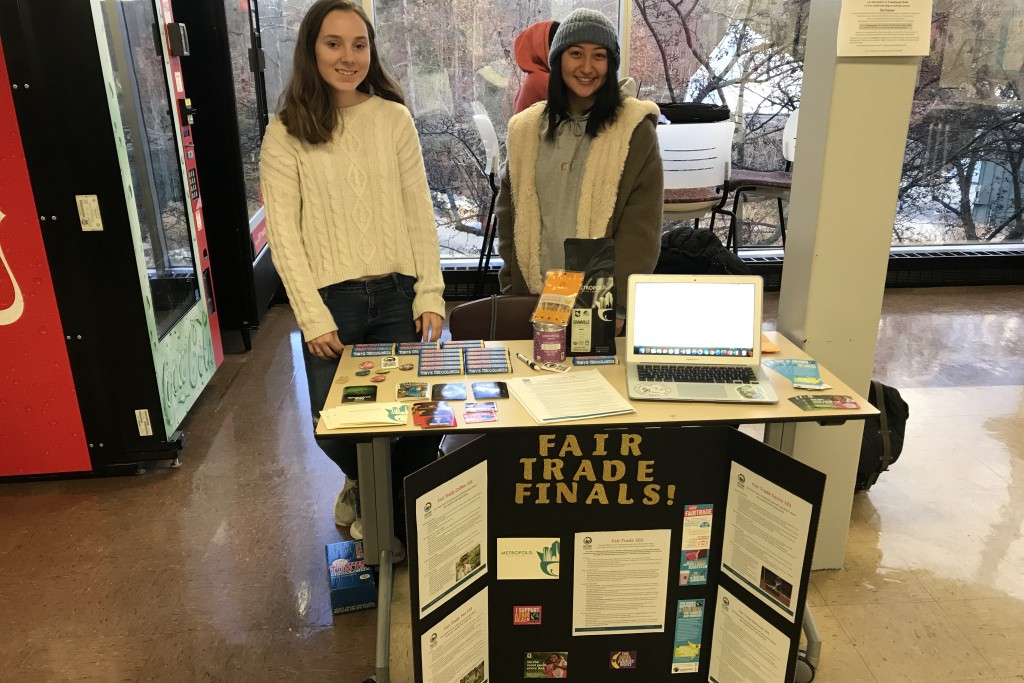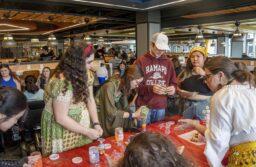
Photo by Erica Meline
During the holiday season, consumerism is at its peak: Doorbuster Black Friday deals, extended mall hours and Amazon’s guaranteed next-day deliveries can turn any person into a shopaholic. In the spirit of giving, it may not necessarily be bad to indulge in the desire to spend. Shoppers may want to be mindful, however, regarding where they are spending their money.
To educate their peers on how to be a mindful consumer, students from Dr. Neriko Doerr’s introduction to anthropology class held a table last Friday in the Fish Bowl on the importance of Fair Trade, a global movement and dedicated to guaranteeing fair wages and safe work environments on farms throughout the world.
“Fair Trade is all about knowing where your food or other products are coming from,” said Hiroo Nakamoto, sophomore international studies major, who was running the table. “A lot of big corporations don’t want to tell their consumers if there’s any type of child labor, sweatshops or unethical labor involved in producing their goods. Fair Trade products tell you exactly where the products are coming from.”
When shoppers buy Fair Trade, they can be sure that none of these unethical practices occurred to produce their products. Major companies such as Apple and Nike have been exposed over the year for such unethical labor resources, so it is critical that consumers educate themselves on Fair Trade to hold businesses accountable.
“Fair Trade is just companies providing equal pay and better working conditions for all their labor, from the bottom all the way to the top of the corporation,” said Junior and biology major Kathryn Cabrera, who was also one of the students running the table.
Cabrera explained that with the holidays approaching, buying Fair Trade gifts is extremely important. She advised students to shop mindfully and look for Fair Trade products whenever possible.
“It’s definitely better to get stuff that’s made from higher quality that might cost a little more as opposed to getting more stuff that was not made with the right practices,” said Cabrera.
It may be tempting for shoppers to buy cheaply made inexpensive items for the sake of saving a few dollars. More often than not though, this reduction in price is made up for on the production level with unfair and unethical practices.
“It’s really a moral thing. Fair Trade products may be a little more expensive, but when you don’t buy Fair Trade, you're supporting practices like child labor, so you have to think about that. But it does come down to your own ethics and your moral standards.”
This tabling was one of many projects the students in Dr. Doerr’s class were involved in to help educate the campus on Fair Trade. The students screened a documentary on chocolate production and the child labor tied to the industry. Nakamoto therefore explained that at the tabling, they were giving away certified Fair Trade chocolate.
The tabling also had a gift basket raffle that students could enter for visiting the table. The basket included an assortment of Fair Trade items including snacks, tea and coffee beans. Cabrera stated that the organization, the Fair Trade Campaign, supplied them with these prizes. The organization helps colleges and other communities launch Fair Trade initiatives.
Both Cabrera and Nakamoto said learning about Fair Trade over the course of the semester has given them a valuable perspective on what it means to be an ethical consumer. They are now able to not only shop more mindfully, but educate others on how to as well.
“I had heard of the term Fair Trade before but I didn’t know much about it. Being in this class, and especially working on this project, has helped me know more about Fair Trade and be able to share the information with other people.”
Holding corporations accountable for their actions can feel intimidating, as many companies lack transparency when it comes to these issues. There are useful tools, however, that consumers can utilize when it comes to researching Fair Trade items.
During the fall semester, Ramapo College implemented a website as a resource for members of the community to turn to for guidance on Fair Trade. According to the website, it “serves as the resource center for researches (existing ones as well as ones produced by students as class and co- and extra-curricular activities), teaching materials, and class project models.”
For more information, visit: https://www.ramapo.edu/fair-trade/
emeline@ramapo.edu





